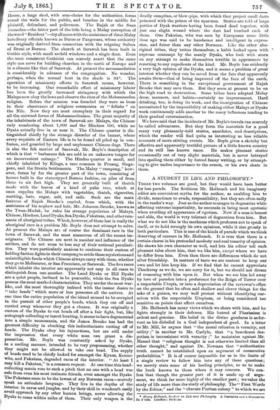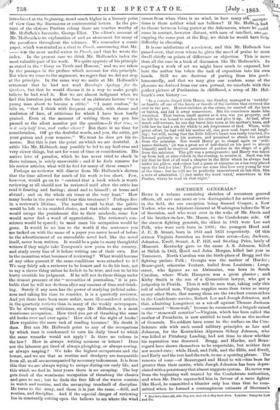A STUDENT IN LIFE AND PHILOSOPHY.*
THESE two volumes are good, but they would have been better for leas parade. The fictitious Mr. Holbeach and his imaginary editor are convenient myths for the author, as enabling him to divide, sometimes to evade, responsibility, but they are often sadly in the reader's way. Just as the author manages to dogmatize while affecting extreme impartiality, he succeeds in being most egotistic when avoiding all appearance of egotism. Now if a mania honest and able, the world is very tolerant of dogmatism from him. But what we do not like is the meekness which professes not to speak of itself, or to hold strongly its own opinions, while it sins grossly in both particulars. This is one of the kinds of parade which we think deserving of censure in Mr. Holbeach. It is true that there is a certain charm in his pretended modesty and real tenacity of opinion. He shows his own character so well, and lets his editor tell such pleasant tales about him, that we like him, except where we have to differ from him. Even then there are differences which do not alter friendship. In matters of taste we are content to keep our own and let him keep his. If we find that he cannot appreciate Thackeray as we do, we are sorry for it, but we should not dream of reasoning with him upon it. But when we see him led away by love of paradox into a preference for the Reign of Terror over a respectable Utopia, or into a depreciation of the reviewer's office on the ground that he often said shallow and clever things for the sake of a guinea, we may well protest without identifying our- selves with the respectable Utopians, or being considered too sensitive on points that affect ourselves.
Mr. Holbeach has many views which we share with him, and he fights strongly in their defence. His hatred of Pharisaism is ardent and genuine. His belief in the divine goodness is as fer- vent as his disbelief in a God independent of good. In a letter to Mr. Mill, he argues that "the moral criterion is veracity, not utility ;" in another to Mr. Carlyle, that "a beneficent des- potism is inconsistent with veracity ;" he maintains against Mr. Mansel that "religious thought is not otherwise limited than all other thought," and against Dr. Newman that "authoritative truth cannot be established upon an argument of consecutive probabilities." It is of course impossible for us in the limits of a single review to follow him into any of these questions ; we merely state some of his leading principles, so as to make the book known to those whom it may concern. We con- fess that though the greater part of it is made up of argu- ment, we think far more highly of the smaller part ; we value the study of life more than the study of philosophy. The" First Words by the Editor," and the "obscure Puritan colony" to which we are
• Henry Holbeaeh, Student in Life and Philosophy. A. Narrative and a Diseuasion In 2 vols. London: Stra‘lan. introduced at the lieginning, stand much higher in a literary point of view than the 'discussions or controversial letters. In the pic- ture of the obsCure P.uritan colony there are touches worthy of Mr. Holbelsch's favourite, George Eliot. The editor's account of Mr.-Holbeach-is au explanation of and an atonement for many of the paradbxes throughout the volumes. We remember a comic paper, which was started as a rival to Punch, announcing that Mr.
' was the most useful writer in Punch, and that he wrote the index. In the present case we think Mr. Holbeach's index the most valuable part of his work. We quite approve of his principle as stated in the "Essay on Truth and Honour," and we are taken by the passages in the preface which account for this principle. But when we come to the argument, we regret that we did not stop at the principle. In the same way we smile at Mr. Holbeach's statement that he had not read Barclay's Apology for the Quakers, but that he would discuss it in a way to make people believe he had read it. But we are almost indignant when we find this harmless jest made the base of an elaborate lecture "to a young man about to become a critic." "I must confess," he tells us, "that I think with frequent anguish, with shame and confusion of face, of criticisms for which I have been loudly praised. Even at the moment of writing them my pen has paused as the silent monitor put the question—Is that true, or is it only half true, and rather clever? But there is no time for consideration. Off go the doubtful words, and you, the critic, get your guinea and your remorse." We trust he does get his re- morse. But this is just the point on which we are doubtful. A critic like Mr. Holbeach may possibly be led to say half-true and very clever things, but not for want of time or consideration. His native love of paradox, which he has never tried to check in these volumes, is solely answerable ; and if he feels remorse for his review articles, what will he feel for many of these essays ?
Perhaps no reviewer will dissent from Mr. Holbeach's dictum that the time allowed for much of his work is too short. Few, however, would go on to "contend that a book which is worth reviewing at all should not be reviewed until after the critic has read it feasting and fasting; aloud and to himself ; at home and abroad ; and on the whole six times at the very least." How many books in the year would bear this treatment ? Perhaps five in a reviewer's lifetime. The result would be that the public would be left to its unaided choice, and that while many authors would escape the punishment due to their misdeeds, some few would never find a word of appreciation. The reviewer's con- science would be spared ; in most cases his occupation would be gone. It would be no loss to the world if the sentences you see tacked on with the name of a paper you never heard of before to the advertisement of an unreadable novel had, like the novel itself, never been written. It would be a gain to many thoughtful writers if they might take Tennyson's new poem to the country, and study every line of it before writing one of their own. But in the meantime what becomes of reviewing? What would become of any other pursuit if the same conditions were attached to it? We may fairly ask a reviewer to be honest and to do his best, not to say a clever thing unless he feels it to be true, and not to let his hurry override his judgment. If he will not do these things under the utmost pressure of the "necessities of journalism," it is pro- bable that he will not do them after any amount of time and think- ing. Surely if any man has the power of studying judicial calm- ness and taking his time to consider, it is a quarterly reviewer.
• And yet there have been more unfair, more ill-considered articles in the quarterly reviews than in many of the weekly newspapers. To be always writing criticisms, says Mr. Holbeach, is a most wearisome occupation. How tired you get of thrashing the same old husks over and over again ! How sick of the sight of books ! How repulsive the mere task of reading becomes! No doubt it does. But can Mr. Holbeach point to any of the occupations by which man is condemned to earn his daily bread to which the same remarks would not apply ? Is there no tedium in the law? How in always writing sermons or letters? Does not the labourer get tired of always ploughing, or always sowing, or always reaping? We take the highest occupations and the lowest, and we see that as routine and drudgery are inseparable from all, so all are accompanied by necessary tediousness. It is from this that we are always trying to escape during our early life, and this which we find in later years there is no escaping. The boy gets tired of the wearisome occupation of thrashing the classics and goes to sea ; but he finds the free life of the waves consists in watch and routine, and the unvarying treadmill of discipline. He turns to the army, and there it is just the same, — drill, and routine, and discipline. And if the especial danger of reviewing lies in constantly cutting open the bellows to see where the wind comes from when there is no wind, in how many oth, upa_ tions is there neither wind nor bellows? If Mr. --1/ oc- cupying the same post at the Rag, we think he would have lisle °Ih"Ilt had to choose between being porter at the Athenum, where he voila
come in contact, however distant, with men of intellect, ann difficulty in choosing.
It is one misfortune of a reviewer, and this Mr. Holbeach has passed over, that even where he gives the meed of praise lie must dwell chiefly on points of difference or objection. This is more than all the case in a book of discussion like Mr. Holbeach's. Ire regarding a work of art we might have much to expound, but here the author has taken the task of exposition into his own hands. Still we are desirous of parting from him good- humouredly, and that we may give our readers some of the pleasure we derived from our own perusal, we conclude with this perfect picture of Puritanism in childhood, a scrap of Mr. Hol- beach's own history :—
" In a certain chapel little Henry, one Sunday, managed to 'twiddle' or fumble off one of the knots or tassels of the cushion that covered the seat in the pew. Horror-stricken at the crime, he carried off the knot or button, and hid it away somewhere. But his conscience made him wretched. That button, small matter as it was, was yet property, and he felt he was bound to confess his crime and give it up. At last, after much self-torture, he one day burst into tears at his mother's knee, and told her he had a sin for which to ask forgiveness of God. When, with great effort, he had told his mother all, she, poor soul, burst out laugh- ing; but still, seeing that the little fellow's heart was really touched, she listened patiently to his sorrows, and promised to obtain his pardon from the minister. Nor would Harry go to chapel again on 'ordi- nance-Sabbath' (it was a great act of self-denial on his part to absent himself) until he received assurance of pardon in the shape of a gift from the minister. The gift was a pomegranate; and Harry was taken up from bed, at nine o'clock in the evening, to receive it. Such was his- joy that he first of all read a chapter in the Bible which he always had under his pillow, and—then had a game at ninepins on a tea-tray placed upon the bed for him! This gives me some idea how very young he was at the time ; but he told me he perfectly remembered an ink-blot, like a note of admiration (!) just under the word 'extol,' somewhere in the Psalms, where he read on that night."































 Previous page
Previous page